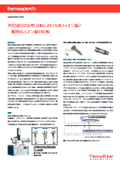【事例紹介】異臭成分の定性分析におけるイオン源の比較
AEIイオン源と一般的なイオン源の比較
異臭分析は食品に限らず機器からの排気や大気、建築分野などに幅広く行われる重要な分析テーマです。これらの人間が不快に感じる異臭化合物の中には嗅覚閾値の低いものが多数見られます。 測定に関わる技術として臭気化合物の捕集方法、ガスクロマトグラフの分離、検出器の開発など性能の向上が加速的に進められてきました。こうした流れの中、ガスクロマトグラフ質量分析計における高感度化の一環としてイオン源の改良も進み、近年では従来型に対し10倍以上の感度向上が得られるものが報告されています。 本アプリケーションノートでは、定性分析において標準のイオン源(Thermo Scientific ExtractaBriteイオン源)よりも感度が向上したAdvanced EI(AEI)オン源の効果がどのような利点を生むかについて、異臭原因化合物の一つであるジェオスミンを用いて検証した結果を紹介します。
基本情報
詳細はお問合せいただくか、PDFをご覧ください。
価格帯
納期
用途/実績例
詳細はお問合せいただくか、PDFをご覧ください。
カタログ(3)
カタログをまとめてダウンロードおすすめ製品
取り扱い会社
サーモフィッシャーサイエンティフィック インコーポレイテッドの日本法人である、サーモフィッシャーサイエンティフィック株式会社は、総合システム分析機器およびバイオ関連機器、研究用試薬などの販売会社です。日本国内では横浜、東京、大阪、福岡、名古屋に拠点を持ち、質量分析計をはじめとする各種分析機器、各種バイオ関連機器、計測器、医療機器、ラボ用ソフトウエア、研究用試薬を取り扱っています。















































